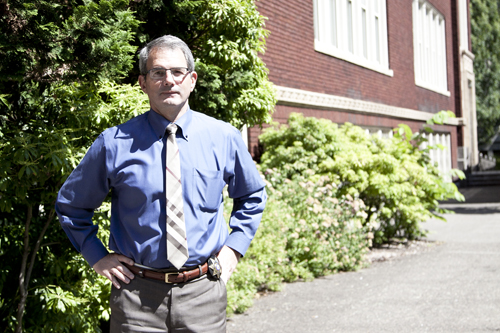On the evening of Tuesday, July 9, at approximately 9:43 p.m., Campus Public Safety officers went in foot pursuit of Robert Jensen, a nonstudent and registered sex offender who was the suspect in a report to CPSO about a male masturbating in public on the second floor of the School of Education building.
PSU regulates building access

On the evening of Tuesday, July 9, at approximately 9:43 p.m., Campus Public Safety officers went in foot pursuit of Robert Jensen, a nonstudent and registered sex offender who was the suspect in a report to CPSO about a male masturbating in public on the second floor of the School of Education building.
Jensen fled when officers attempted to contact him and ran toward Cramer Hall. Upon reaching the building he tried to open the door, but it was locked, preventing Jensen’s escape and allowing CPSO officers to take him into custody. His charges included felony public indecency and criminal trespassing.
“Two weeks ago that door would have been unlocked, and that suspect might have escaped,” CPSO Chief Phil Zerzan said.
On June 26, Portland State began to standardize the hours buildings on campus are open, generally 7:30 a.m. to 8 p.m. Monday through Friday for many buildings.
“This decision was a partnership between the vice president of Finance and Administration, the vice president of Enrollment Management and Student Affairs and the provost, as a way to reduce the ability of persons not affiliated with the university from coming onto campus to commit crime,” Zerzan said.
According to an email sent out by the university, this move will also “provide for responsible stewardship and sustainable practices by reducing energy consumption in buildings that are not
being utilized.”
Zerzan said that the move to standardize building hours came after seeing a significant increase in general crimes and crimes against female students occurring in campus buildings on weekends.
“We have to be conscious of who is getting into our buildings and for what purposes. We have to balance convenience with safety and security,” he said.
On weekends and after hours, events and classes will be accessible through a single, marked entrance in the building, designated by a green sticker and a card reader on the door. These entrances will be accessible in accordance with the Americans with Disabilities Act.
Students and staff members who need to get into buildings after hours—to use study areas or computer labs, for example—will be able to do so via an access identification badge.
Areas of access can be tailored to the student or staff member’s needs and their program of study, Zerzan said.
“We’ve leveraged our existing technology and are working toward expanding that technology,” he said. “[Requiring these badges] increases accessibility while decreasing the ability of nonaffiliated offenders to get into our buildings.”
After hours access ID badges are available through ID Services, located on the first floor of Neuberger Hall. Access requests can also be obtained by emailing [email protected].





